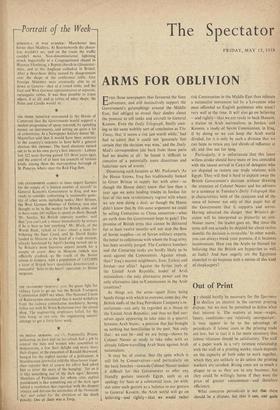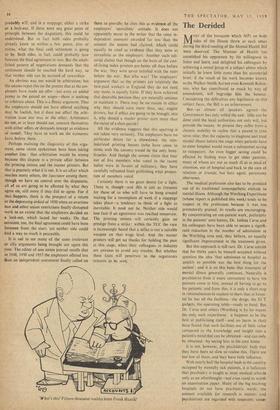Out of Print
Ir should hardly be necessary for the Spectator to declare an interest in the current printing dispute; but we may be permitted to define what that interest is. The matters at issue—wages, hours, conditions—are relatively unimportant : it may appear to be to the advantage of periodicals if labour costs in the printing trade are low, but in fact it is far more necessary that labour relations should be satisfactory. The staff of a paper work in a very intimate relationship with the staff of a printing works; much depends on the capacity of both sides to work together, which they are unlikely to do unless the printing workers arc satisfied. Rising costs are as much a plague to us as they are to any business; but they could be willingly borne if they were the price of greater contentment—and therefore efficiency.
What concerns periodicals is not that there should be a dispute, but that it can, and quite probably will, end in a stoppage; either a strike or a lock-out. If there were any great point of principle between the disputants, this could be understood. But in fact both sides probably already know to within a few pence, plus or minus, what the final cash settlement is going to be. Both sides, in fact, could probably now forecast the final agreement in Coto. But the estab- lished pattern of negotiations demands that the settlement should be reached the hard way, so that neither side can be accused of cowardice.
An obvious way out would be arbitration; but the unions reject this on the pretext that as the em- ployers have made no offer—not even an added penny in the pound on wages—there is nothing to arbitrate about. This is a flimsy argument. That the employers should not have offered anything may be foolish, but it does not affect the arbi- tration issue one way or the other. Arbitrators do not, or at least should not, concern themselves with either offers or demands (except as evidence of mood). They have to work on the economic facts before them.
Perhaps realising the illogicality of this argu- ment, some union spokesmen have been taking another line : that arbitration would be wrong because this dispute is a private affair between the printing unions and the master printers. But that is precisely what it is not. It is an affair which touches many others, the Spectator among them; though we have no control over the disputants, all of us are going to be affected by what they agree on, still more if they fail to agree. For if that happens, there is the prospect of a return to the depressing ordeal of 1950 when an overtime ban and other union restrictions finally disrupted work to an extent that the employers decided on a lock-out; which lasted for weeks. On that occasion, too, the final agreement could have been foreseen from the start; yet neither side could find a way to reach it peaceably.
It is sad to see many of the same irrelevant or silly arguments being brought out again this time. The editor of one union journal recalls that in 1948, 1950 and 1955 the employers offered less than an independent assessment finally called on
them to provide; he cites this as evidence of the employers' unrealistic' attitude. It does not apparently occur to the writer that the same in- dependent assessors awarded far less than the amount the unions had claimed, which could equally be cited as evidence that they were as unrealistic as the employers. Another such edi- torial claims that though on the basis of the cost- of-living index printers are better off than before the war, 'they were never satisfied with the rates before the war.' But who was? The employers' argument that as the printers are relatively the best-paid workers in England they do not need any more, is equally futile. If they have achieved that desirable position they are naturally anxious to maintain it. There may be no reason in ethics why they should earn more than, say, engine drivers; but if ethics arc going to be brought into it, why should a master printer earn more than the rector of a slum parish?
All the evidence suggests that this sparring is not taken very seriously. The employers have no particular desire for a showdown; the non- federated printing houses (who have come to terms with the unions) would be the only bene- ficiaries. And though the unions claim that four out of five members who voted in the recent ballot were in favour of militancy, they have carefully refrained from publishing what propor- tion of members voted.
Certainly there is no great desire for a fight. There is, though—and this is just as tiresome for those of us who will have to hang around waiting for a resumption of work if a stoppage takes place—a tendency to think of a fight as inevitable. It need not be. Neither side would lose face if an agreement was reached tomorrow. The printing unions will certainly gain no prestige from a strike : within the TUC the view is increasingly heard that a strike is nora suitable weapon on that wage level. And the master printers will get no thanks for holding the pass at this stage, when their colleagues in industry are anxious to avoid any trouble. But whether these facts will penetrate to the negotiators remains to be seen.
'What's this? Fifteen thousand roubles from Frank flax( II?



































 Previous page
Previous page